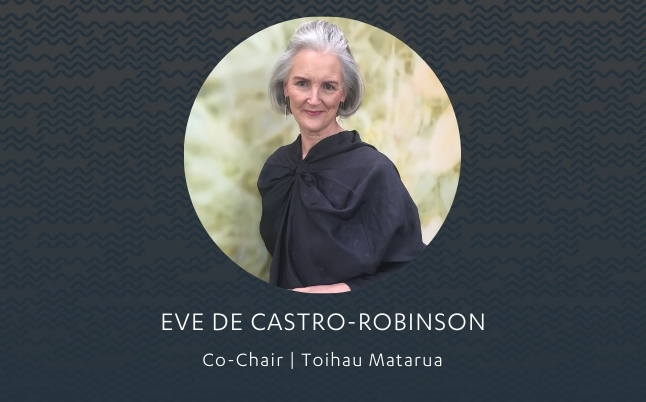In our Meet the Board series we invite you to sit down and learn more about each SOUNZ board member. Today we introduce Board member and Deputy Chair | Toihau Tuarua Eve de Castro-Robinson.
Give a brief introduction about yourself.
A tall, intense, leftwing, bipolar, Scorpio, 60-something creative, sound-botherer and retired composition lecturer, with a strong and abiding interest in making, and supporting, music in Aotearoa/New Zealand.
What do you do outside of your work at SOUNZ?
I decided to concentrate solely on freelance work from early 2020, so took early retirement as Associate Professor of Composition at the University of Auckland where I taught for 25 years, was director of the contemporary music ensemble The Karlheinz Company and co-ordinator of Composition workshops, visitors and events.
I was always proportional, and the three-day week suited my freelance work on creative projects, from music for orchestra, voice/s, ensemble, and solo instruments including choreographed microscores and theatrical works as well as recordings. I’ve released five solo CDs (Atoll, Rattle) and have always curated and organised concerts and events, co-forming groups such as CadeNZa, and hear|say.
What is one of your earliest musical memories?
I was a pre-teen girl, and Dad brought home a record of African drumming – I remember the fire was burning in the grate, and his palpable excitement at the driving music, exhorting me to listen. I was rather an introverted child, but with intense feelings, and have never forgotten the impact of this electric atmosphere. Dad, who died in 2016, was an oblique influence on my music through the decades, frequently a step ahead of me with quirky thoughts and references.
What do you think makes the music of Aotearoa New Zealand unique?
The diverse individuals, groups and institutions who make up the scene, and the unusually deep camaraderie amongst us. This eases a two-way flow between musicians, genres, and approaches, as can be evidenced at Audio Foundation improv nights, Nelson Composers’ Workshops, and APRA Silver Scrolls award ceremonies, for example, where a range from classical trained musos to jazzers and grunge noisers can all rub musical shoulders. I love the way I can bowl up to anyone in our music world for a direct kōrero.
Provide a brief overview of your personal journey with music.
A shy and intense child who loved music, from hymns, musicals like My Fair Lady (I hid myself away to conduct along to Ascot Gavotte on my brand new LP), to classical and pop stuff Mum played on the piano and marching back to class to Colonel Bogey at intermediate. There was trudging dutifully to piano lessons (eventually getting ATCL, at 20, on the third try), and gradually morphing into a quietly rebellious teenager learning drumkit and going to classical and rock gigs with equal fervour, from Menuhin to Roxy Music, Grappelli to the Stones; then a breakthrough into contemporary classical when maverick piano teacher Peter Crowe gave me Lilburn, and suggested I “go up the hill" to hear what The Karlheinz Company was doing at the university”. Went up the hill, heard Stockhausen, Varèse, Whitehead, Lockwood, and never came down, but still working on how to make sense of my own compositional journey, which started more or less by chance and has lurched along in search of itself ever since.
Why is music important to New Zealand culture?
Music is embedded in the culture, whether we like it or not. Thinking of a random selection of musics I’ve heard this week – supermarket muzak, distant cheers of Tongan rugby league supporters, students strutting their sonic stuff, and a visiting child banging on the piano, all contribute to the soundscape, and are grist to the mill for my personal, as well as teaching work, since I don’t tend to discriminate. In terms of the importance within the wider culture, especially in early education and cultural institutions, anyone with the opportunity or means to should encourage any form of music-making. From the womb onward, the opportunity to hear, then make, a range of vocal, instrumental or found sounds, should be available to everyone, with no prejudicial exclusivity or talk of ‘tone-deafness’ that I remember from my childhood. Music belongs to everyone.
